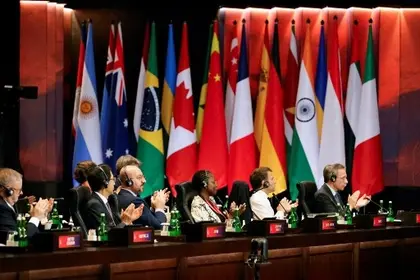The G20 summit that took place on Nov. 15 and 16, 2022 happened against the backdrop of Russia’s aggressive war in Ukraine and the fear of a WWIII about to erupt.
While there are many things about it that raised eyebrows, its outcome was still largely beneficial to Ukraine, not the least because Russia excels at shooting itself in the foot.
JOIN US ON TELEGRAM
Follow our coverage of the war on the @Kyivpost_official.
Chaotic preparations
This year’s summit was already marred in the preparatory stage.
Both President Volodymyr Zelensky and Russia’s President Vladimir Putin were invited to participate even though Ukraine, unlike Russia, is not a G20 member state. Zelensky made it clear that he would turn down the invitation if Putin agreed to be present. In the end, Ukraine managed to gain a minor diplomatic victory as Putin chose not to participate, sending Russia’s Minister of Foreign Affairs Sergey Lavrov instead.
As a result, Zelensky directly addressed by video speech the G20 leaders, who represent countries beyond the so-called Western world, and called on them to put an end to Russia’s war against Ukraine. Peculiarly, he referred to the G20 as G19 to reflect Ukraine’s ongoing endeavor to kick Russia out of the group.
While this goal may sound unrealistic because the G20 countries include economies that are either covertly or overtly on Russia’s side, such as China which recently sided with Russia during a UN General Assembly on reparations to Ukraine, what matters is that the outcome of this summit, reflected in a joint declaration, is positive for Kyiv.
Identifying the culprit
Before the summit, Russia tried hard to eliminate any mention of its illegal actions in Ukraine to prevent a mention in the joint document that qualifies Russia as the ultimate war culprit. And yet this is precisely what happened.
Point three of the joint document reads, “We reiterated our national positions as expressed in other fora, including the UN Security Council and the UN General Assembly, which…deplores in the strongest terms the aggression by the Russian Federation against Ukraine and demands its complete and unconditional withdrawal from the territory of Ukraine.”
Even though the subsequent line emphasizes that “most members strongly condemned the war in Ukraine and stressed it is causing immense human suffering and exacerbating existing fragilities in the global economy – constraining growth, increasing inflation, disrupting supply chains, heightening energy and food insecurity, and elevating financial stability risks,” the document also mentions that there were “other views and different assessments of the situation and sanctions.”
For a gathering of G20 countries such a formulation is a solid achievement, especially since before the summit there was a concern that the final document would be too vague, referring to “challenges” of the “unknown kind” that the world perennially faces.
The art of shooting oneself in the foot
This success was possible not only through diplomatic efforts from Germany and France, but also because of Russia’s idiosyncratic talent of making things worse for itself.
During the summit, Russia, after surrendering Kherson, the only significant city captured after the illegal Feb.24 invasion, launched the most massive missile attack to date on Nov. 15, destroying critical infrastructure in an effort to force Ukraine to negotiate.
As a result of this despicable act, not only Ukrainian cities and citizens suffered, but two Polish men were killed as a missile – which according to preliminary info was a Ukrainian air defense rocket – landed in the village of Przewodów, forcing the Polish government to convene an extraordinary meeting late on Nov.15. The act also sparked fears that NATO was about to join an open conflict with Russia.
With the prospect of WWIII about to erupt, if Russia had wanted to change the formulation in point three of the declaration, it would most likely not have succeeded. As a rule, the idea of an all-out war worldwide does not appeal to the governments, even if they support you for their own economic and ideological reasons.
And yet while the final statement, produced in a messy environment of conflicting interests, is largely positive for Ukraine, it shows that Russia still has the capacity, though reduced, to influence countries worldwide which serves once again as a reminder that Ukraine’s diplomatic efforts must be ramped up outside of the Western world without further ado.
The views expressed are the author’s and not necessarily of Kyiv Post.
You can also highlight the text and press Ctrl + Enter



